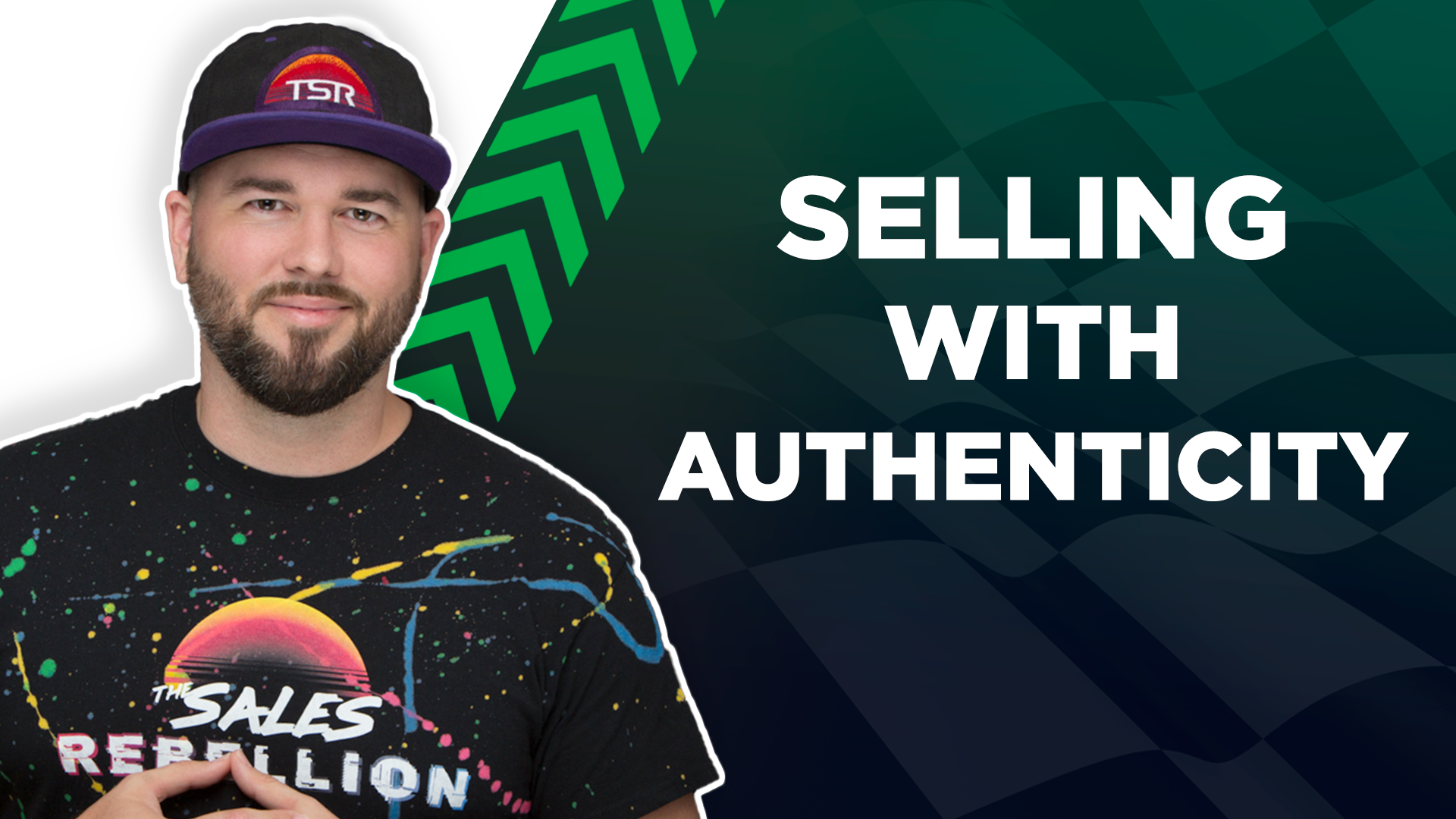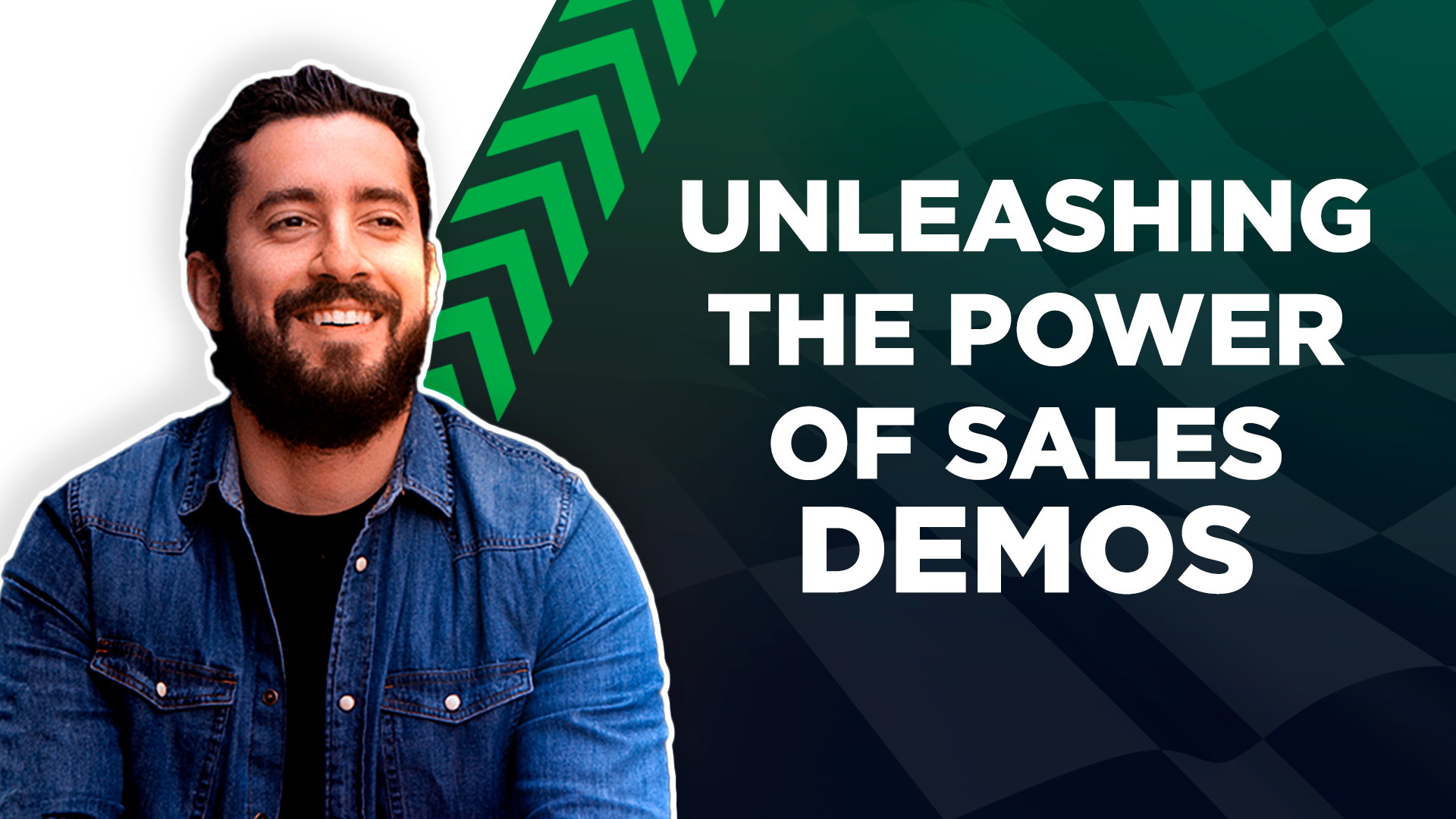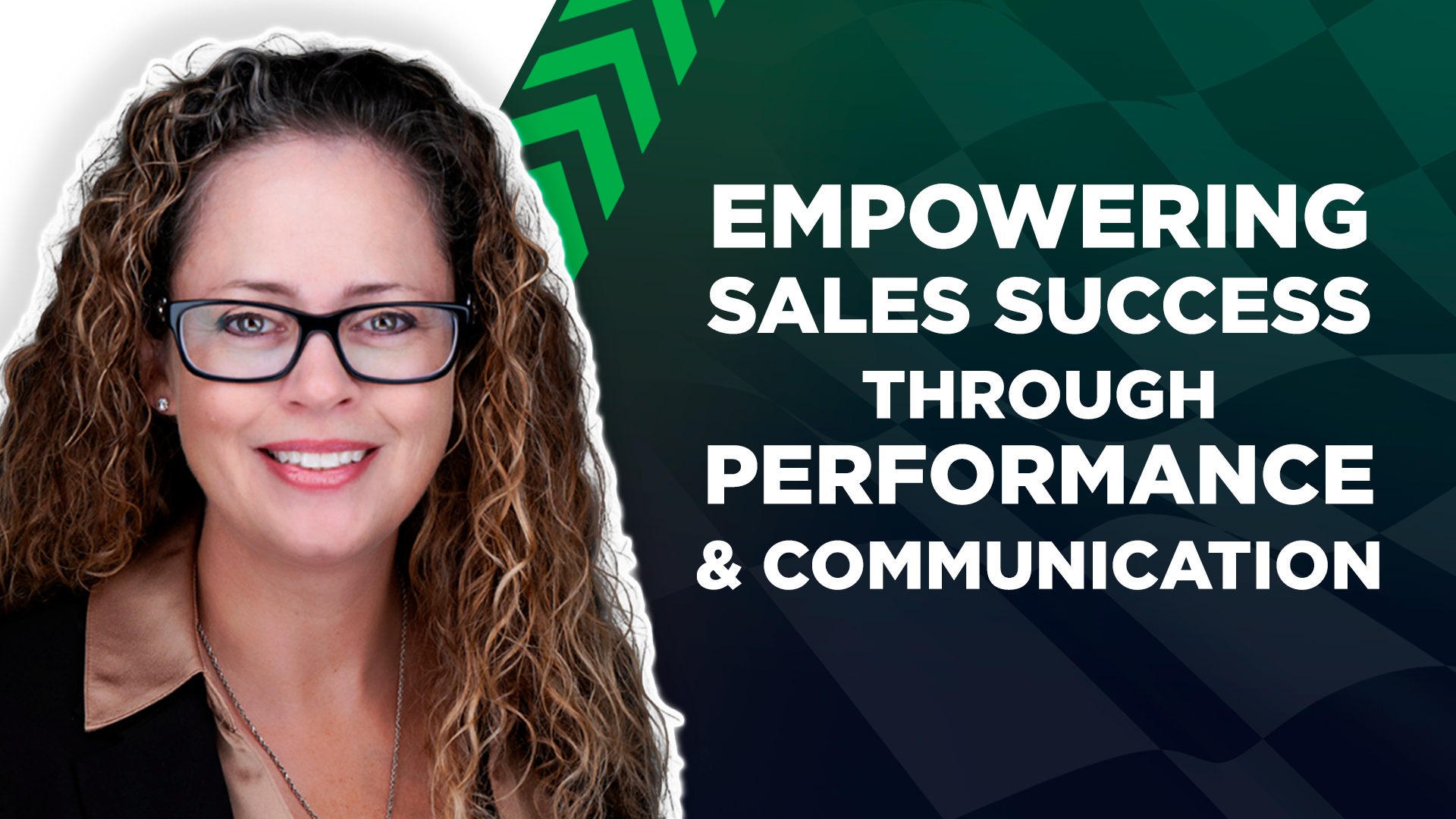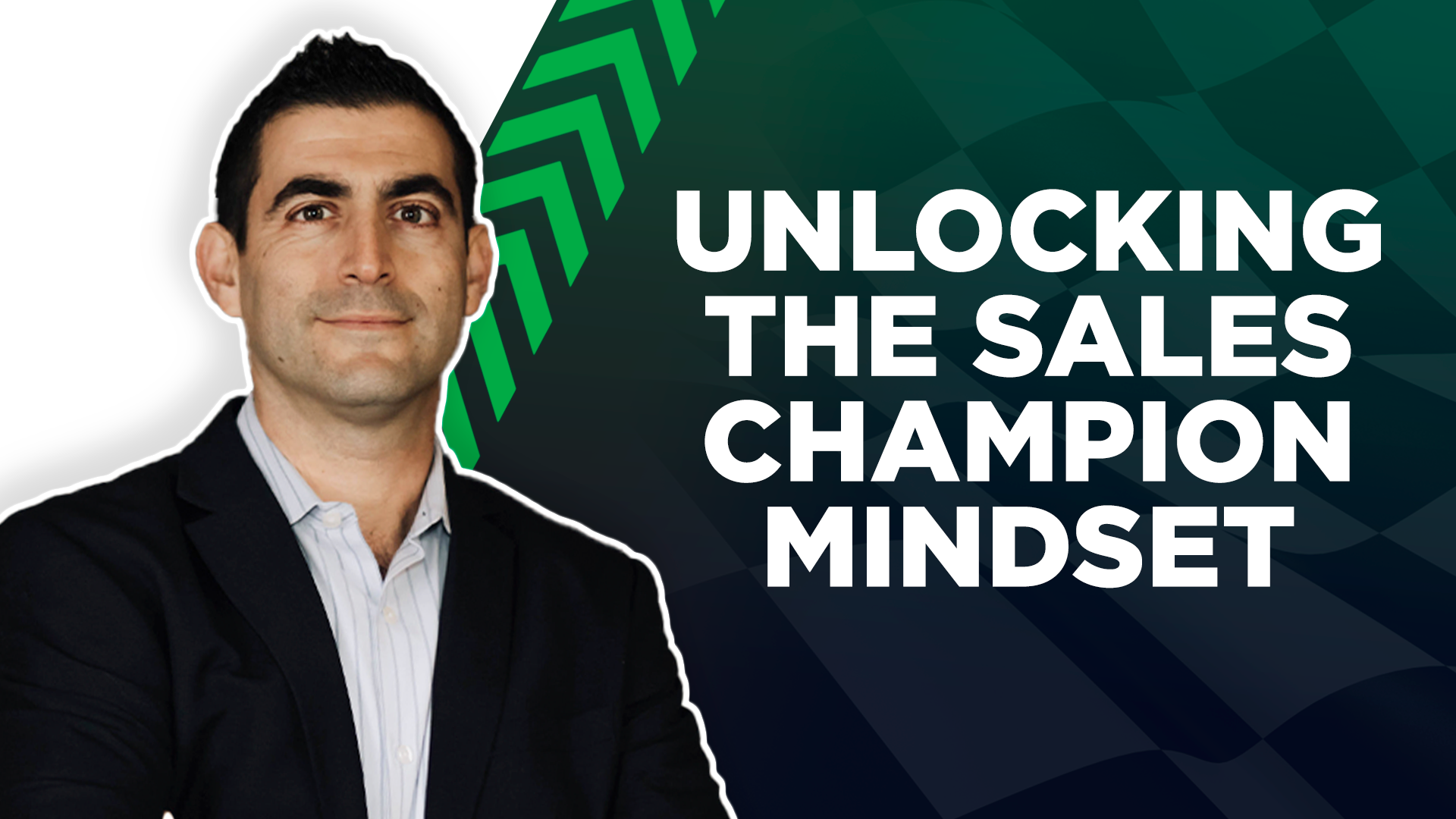Table of Contents
Selling with Authenticity
In episode 74 of Pit Stops to Podium, we sit down with Dale Dupree, aka The Copier Warrior. Dale is the Founder and CSO at The Sales Rebellion, a renowned organization offering sales coaching, training, mentorships, and tools. With a background in the copier industry and a passion for authentic sales, Dale shares his expertise on selling with authenticity.
Our conversation with Dale centers around the importance of developing an authentic voice in sales and improving the buyer-seller relationship. We explore the strategies for taking risks, building credibility, and managing the need for approval in sales. Additionally, Dale provides valuable insights on building trust with clients and prospects. Join us as we uncover the secrets to selling with authenticity and learn from Dale Dupree, The Copier Warrior, on how to elevate your sales career to new heights.
If you’re ready to learn from one of the best, then buckle up and hold on!
Pitstop Highlights
Developing an Authentic Voice in Sales
Salespeople need to be genuine, but blunt. It's ok to do more talking than listening if the moment, and particular customer, call for it. Salespeople need to create compelling moments for customers that feel like an experience.
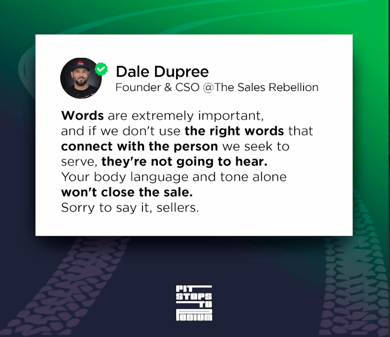
Effective Words to Use on Discovery and Close Calls
It's important to understand that each customer is different and deserves a unique mindset. If you're asking less than 50 questions in a discovery call, then it's not a very good one. Also, how you word the questions is important (e.g. "What's your budget?" is different from "Is this something you think you could afford?").
"Questions shouldn't probe people, but rather allow them to release and share."
Is People Pleasing Good or Bad for Sales?
If a customer feels that they're not being coddled by a salesperson, it causes them to view the salesperson as more genuine and someone they can trust more. Blunt honesty is something most people don't get in their lives, so if they get it with a stranger (salesperson), they are often willing to pay more for a product sold by them.
"I think us as sellers, we shouldn't be out to 'make new friends', we should be out trying to earn trust and credibility from the people we seek to serve."
Playing the Long Term Game with Sales
Having a bigger picture perspective is key, as opposed to getting lost in each individual sale or a particular year's quota. If you find yourself saying "I need this sale", then you're living in a scarcity mindset, and you probably don't have a big enough pipeline. Sales needs to be about serving others, not pushing a sale through at all costs.
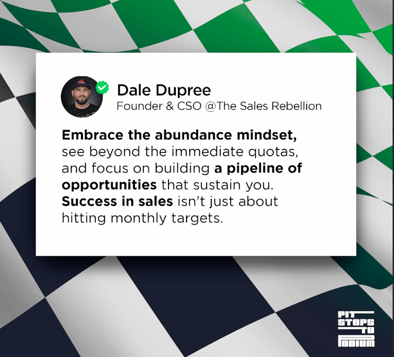
Connect with Dale
Website: https://www.thesalesrebellion.com/
LinkedIn: https://www.linkedin.com/in/copierwarrior/
Full Transcript
Brendan: Hey everyone, welcome to Pit Stops at Podium, the RevPartners podcast where we talk to execs who competed and won in taking companies from high growth to high scale. My name is Brendan Tolleson. I serve as the co-founder and CEO of RevPartners, and I'm delighted to have with me today Dale Dupree for this episode of Pit Stops to Podium. Welcome, Dale.
Dale: Thanks man, appreciate you having me out.
Brendan: Yeah, we're excited to have you, Dale. And for those who may not know who Dale is, Dale is a founder and CSO of Sales Rebellion. And Dale, this is your opportunity to give the elevator pitch on Sales Rebellion and also how you came up with the idea to bring this to life. So what's your past experience look like?
Dale: Sure. Yeah. Sales Rebellion was founded from 13 years of selling the dreaded copy machine in the B2B space. So I actually started in the music industry and toured on a band, signed to a major record label. It was a very creative space and evolved from that directly into copier sales and B2B. And so I was influenced essentially a little bit differently from the perspective of the way that I get in. It wasn't out of college. sales, even though there really is no traditional way. If we're being honest, it was probably one of the weirdest routes that I could have potentially ever taken. And I even in my head at some point said, I'll probably only be here for a couple of years. 13 years later, I was one of the top producers inside of the industry, not just from the perspective of like the companies, the two companies I represented, but also those recognized by manufacturers that were global, publicly traded organizations. And I recognize through the process of selling a commodity box and the way that the transaction behind a copier typically works that that's something a little bit differently than most people where we focus more on creative efforts. We focus more on people. We focus less on product. We focus more on not just the quote unquote value that we bring to the table, but what other people perceive as actual value and will buy into as a fix for their organization box that prints and copies and scans. So I sat back and said, we could probably teach this to a lot of different people and what do you know? The sales rebellion was born in 2019. I actually just hit our four year anniversary last month.
Brendan: Well, congrats. Well, yeah, I think to your point, if you're selling a commodity, then it requires you to be a little bit more creative than relying on that product or service. So I'm excited to unpack a little bit more of those lessons that you've learned in terms of how to be successful, regardless of market, especially when you feel like you have a commodity-based product. But you mentioned something about music career, and that's a good segue into fun facts about our guests. So Dale, let's unpack that a little bit more in terms of what you were doing. What kind of music were you a part of.
Dale: I don't think anybody ever grows up just to say it or starts as a child looking at the future of what it will be to grow up and to become an adult and says, I want to be a copy or salesperson. So really, the story just has to start somewhere. And that's where it starts is that I was a dreamer. And I believe that the most important thing to me is what I should say instead of what I believe. entertain them, have a good time, and ultimately create some type of impact on their life. Now, I'm not going to say that as a kid that I had these dreams of impacting people on the level that I do as an adult, but I will say that music changed my life. And because it changed my life, I knew that it was something I wanted to do and to give to other people as well, too, to hopefully change theirs. Whether that be the lyrics to a song or the melody itself, whatever the case, whatever somebody could connect with, that was really where my dreams were. 17 years old, I took a band that I'd been playing in for a couple of years. We set up our own 52 day tour. We ran it. And when we got home, it was like Christmas. There were so many record label opportunities and offers that it was just like a no brainer for me to do anything else with my life to include college. I skipped college. I went right into basically working for myself, played in a band.
Brendan: Wow. And what was your, were you instrument, vocals? What was your flavor choice?
Dale: I dabbled in all the instruments. So I played something, something on pretty much everything. Was I good at it? You know, no, I mean, like I was OK at guitars and drums and but mostly just had this like burning desire and passion to be a musician and to kind of understand the craft ultimately instead of being very niche into just one thing. And so I liked picking around at everything and trying to make a sound and create songs. And so for the most part, I wrote everything with one other guy.
Brendan: Hmm, what's the pinnacle of your music career?
Dale: Probably when we stopped, to be quite frank with you, I was at the top of my game. And my guitar player, we were shooting our music video for Warren Brothers Music Group. And my guitar player was late. And it was kind of like one of those things where I was like, oh, great. You know, here's this and this consistent thing inside of something like music. It's a stereotype, but it's also the truth, you know, that there's a lackadaisical mindset. And I was very entrepreneurial, so I was getting pretty heated over it. I finally got a call from the individual member and he said, hey, I'm three days sober from heroin and that's it. I can't make it. It was a gut punch and a shock to the system to an extent. It was something that changed the perspective entirely around my music career altogether. Then there was other instances that occurred ultimately that drove me at that point to just like call the whole thing off at the end of the day, but it helped me to really understand like what's actually important in life. Like I could have kept that band alive, but what was the point? And ultimately the mission that we set out to achieve was not being fulfilled. If anything, we were falling victim to the industry and it was time to move on.
Brendan: Well, that's a powerful, I mean, look, when you find your identity in something and to be able to say, hey, that's not ultimately what I'm here for and what I believe in, that's not easy to walk away from. So kudos to you for doing that. And it's always fun to just get to hear people's stories, even in snapshots. So thanks for being willing to do that. So you're in music, you get in the copier business, you start your own sales rebellion to give kind of, hey, here's some tips, tricks, for how to sell. And so let's dive into that because you have this whole concept around selling with authenticity, which sounds nice, but oftentimes people are fearful of doing that. So let's start first when we think about authenticity. How does that translate into the voice that someone uses when they're selling? So let's empower our listeners with some tips on that side.
Dale: Yeah, if I were to say how we tie in an authentic seller to the rebellion based on action itself around things like tone, I think ultimately actually where we would start is the words that we say. There's a lot of studies out there. There's a really popular one that shows body language, tonality, and then the words we say as the study of what communicates the best, body language being number one, tonality being number two, and the words we say being the third. And what's funny is the words we say is like less than 10%. And what I find interesting about that study is that most sales traders teach it as, yeah, so talk is the least amount possible right inside of interaction. But really what that study tells us is that words are extremely important and that if we don't use the right words and ultimately we say things that don't connect necessarily with the person that we seek to serve, they're not going to hear. They're not going to be listening. Then ultimately like your body language and your tone aren't going to close the sale. I'm sorry to say it, sellers. Where we tie back in that authenticity is to say that ultimately we need to be very genuine and very blunt people as sales individuals that slowing our pace as part of those techniques is important. That listening more than we speak, of course, we believe that to be important, but people can talk about this stuff all day long. Actually acting on it and getting it done is a completely different story. I'd love to sit in on half of the influencers meetings out there that say that they listen more than they talk. and see most of them talk just as much as they listen. And ultimately sometimes that's what a meeting calls for. That's what the moment calls for as well too, to have a great conversation with somebody where you do some talking just the same, especially if as a seller, you're somebody that's more extroverted as an example and the person you're speaking with just juices off that. They enjoy that. They're not necessarily there to speak a whole bunch in the first place. So I think it's more or less a complicated and complex thought and question. of what words do we use on a cold call, on a first appointment, on a discovery, on a close? What are we saying? How direct are we being? Are we being direct in a way that moves the person that's listening, instead of just causing them to read some words, send it up to the brain that says, this person's trying to sell you something, and then they move on with a not interested, right? Or are we doing things that are compelling that create moments for individuals that feel more like an experience than they do just a juncture robot for the first time.
Brendan: Yeah, I like that. And it's, especially, I mean, look, most, well, I think things are changing, but with a post-COVID world, I mean, body language is even more and more important. Like you don't have your voice to rely upon for like a call or an email. Like you are looking at that person. And so I talked to our team a lot about the body language and making sure you understand what you're doing, but also reading the room. So that was it. You talk about body language tonality and then the words you use. And to your point, it's fewer words, words mean more. So what are some, let's use that discovery call to your point, or close, whichever one you want on the bookends, discovery or close, what are some of those words that our audience should be aware of that you find to be pretty powerful or effective?
Dale: So I'll answer like this, that how are we crafting the message in the first place? Are we trying to tell stories? Are we trying to create engagement with the person that we're speaking with? Are we trying to just gather information so that we can continue to qualify them deeper into our system? So now we qualify them, now we're qualifying them for a specific project or product or now a specific price. We need to get rid of that garbage altogether, in my opinion. The thought process for me that makes the most sense is more of an adaptive perseverance mindset and activity to where like when I'm sitting with somebody that I know that a this call is gonna be different than the Last one no matter how I spent it because I'm sitting with a unique individual that it's gonna hear me different They're gonna speak differently and even if they have some of the same needs of you know People that we've helped in the past or people that I've worked with in the past. I have to treat this very uniquely I have to understand it better than I did the last time even if in my head I'm going oh I've been through this before I have to literally detach myself from those moments of thinking that I know everything and curious person. So for the most part, I think all words that are used inside of things like a discovery call have to be in a question format. Like if you don't ask 50 questions in a discovery call and make, you know, less than 10 statements, then I don't think it's a good discovery call, just being honest. And there's not really much that you need to say ultimately in a discovery call. But if we ask questions like what's your budget, right? As opposed to, is this something you think that you can afford? Much different feel emotional context in that question instead of just hear a slated or a boxed question that gets a slated answer. If we're mindful about the way that we deliver things and instead of saying something like, how long have you been with the company? Asking questions more like, what do you want? For you, what's the average tenure at an organization, the organizations that you've been at up until this point? Now I'm asking for a story. I'm asking for a little bit of a deeper of this person and someone said to them saying like I've been here for five years they're probably going to say something like well I've been with a couple companies and I've been with them pretty long term ten apiece and so now I also understand like diligently through the way that I'm using words and asking and phrasing questions more to this person because now I understand that they're a very loyal human and I might not know all the details behind those five years or 10 years per company right but I do know that like nothing is ever a peachy keen in inside of life and so problems and issues and things that they had to overcome and persevere through to stick out for that amount of time. So really the concept here is thinking deeply about the way that we ask questions and not in a way that probes people, but ultimately allows them to release and share, which is the way that a conversation evolves effectively into something that is a sale without you having to sell anything, where ultimately the person on the other side says, I'm into this. I'll buy into this all day.
Brendan: Yeah, I think it's really important. I mean, the whole, to me, it's not curiosity. Like curiosity is not the end goal. Curiosity is a way to uncover those different data points that you can then connect for that storytelling perspective and ultimately understand the why behind the what. So why are they actually looking at what you're providing so that you can connect those dots for them and to be their true champion or ally to get that deal across the line. Let's transition Dale into another topic. And that's, you know, look, I think a lot of salespeople fall into the trap of people policing. And I think you have a pretty unique perspective on how we should think about that in terms of, is that a good thing or a bad thing? And so help our audience understand that desire for approval and how do they understand that's a good thing or a bad thing and how they fight against it.
Dale: Yeah, this one is interesting, right? We as salespeople typically are charismatic. That's what makes us successful and likeable to an extent, what makes us successful. But it doesn't mean that everybody likes me. Doesn't mean that everybody thinks I'm charismatic either. In some instances, some of my best customers are people that didn't like me necessarily when I first met them. And I credibility in the midst of that, that I have a person that says, I might like not like the way this dude rolls, but that's because he's not coddling me. And, and then ultimately, he's telling the truth and being very genuine. And because of that, I can trust this guy. And and again, like, it's all about life experiences, the things that we don't think about as sellers or in general, inside of our business walk, is we don't think about the past of people, what's defined them to this moment. And most of the time, we just don't care, right? Like, business environment with this person that's strictly stick to business. Well, if I don't understand somebody on a deeper level to any capacity, then how the hell am I supposed to sell them this million dollar product without, you know, having to fiercely fight on price and all the other things. Ultimately, that that happens to sellers and that and throughout that process. So I can be accommodating to people. I can be charismatic to people, but that's not the truth. And the truth is blunt. It's honest. And blunt honesty is something that most lives. So to have that by with some strange person that's ultimately trying to sell them something is a it's a rare thing. And ultimately, it also is something that people can be motivated by because they say, I've bought a copy machine in the past and been promised the world and been let down tremendously. And this happens in most cases and most B2B, you know, instances when they buy things like office equipment, and because I understood that that was one of have across the board is that there's there's a level of distrust because someone said something and it never happened to some capacity at some point, that my blunt honesty will literally steamroll my competition even if I'm thousands of dollars more, you know, on a monthly or annual basis to buy my my thing because this person feels differently toward me. So I, I think us as sellers, we shouldn't be out trying to quote unquote, make new friends as much as we should and credibility for the people that we seek to serve because that develops a very unique type of relationship that lasts a lot longer than just the transaction.
Brendan: I like that perspective of not making friends but earning the trust. If I heard you right, the way that you've experienced earning trust is through that, I don't call it radical candor, but it's being open and honest with that prospect or customer, even if it comes at the detriment of you in the short term.
Dale: Yeah, it's all about the long game, right? So if I if I if there's a deal going down and it's got, you know, 90 days before the sale, a lot of sellers would see that especially in the copier space or some kind of commodity space, they would see that they'd go, Oh, this is part of my 90 day funnel me I'd look at that and be like, cool, I've got 1000 other deals that I'll be working for the next two or three years. So this one just is like, kind of a cherry if I win it. And because of that, I'm detached from that immediate outcome. And I'm thinking long term. So if I lose the deal, because of that, I'm going to lose the deal. I'm setting myself up for great success when that contract expires and I get a second go at it, especially from a long-term perspective because that's where, see, a lot of people don't understand that's where most wealth is founded. We as salespeople, if we're not out doing sales because we don't want to make, or if we're out doing sales, I should say, because we don't want to make money, then we should just go get a desk job and take a salary ultimately because salespeople have to be motivated by the I'm more of a purpose guy, but at the same time, I realized that if I hadn't made the kind of money that I did and created the kind of success that I did, I wouldn't have been able to do the things that I've been able to do so far in my life and have the kind of flexibility that I've had. So realistically, we have to remember that if I have this mindset of ultimately building my wealth generationally or from a legacy perspective, as opposed to just this one sale that could maybe pay me $10,000, I'm going to lose and it's going to be a huge loss. inside of my sales career at the end of the day. I'm gonna have to spend 40 years in it, playing the game over and over again. I'm not interested in that. I'm interested in that perspective of how do we do something with a bigger picture perspective in mind to reach an ultimate goal that we desire to have instead of just like what the year's quota looks like.
Brendan: I don't disagree with that. I think it's a really good perspective to have in terms of purpose over paycheck. But for our audience that's listening that says, hey, that's great, but I do have like a 90 day quota or I have a number that I have to manage for my team. Like, how do you balance the realities of, I can't have any of those things unless I do hit these numbers. So how do I balance like, I do need that sale, but I also am being mindful that this relationship long term is what's best for the business and what's best for me. you
Dale: I'd say that that person lives in the scarcity mindset. Because if anybody ever says, I need this sale, then they're lying to themselves. They probably don't have a big enough pipeline, as a matter of fact, in most cases. So like, if I looked at my average pipeline, like I sold anywhere between seven and nine deals a month. And like, from the perspective, and those are all net new businesses, right? So not including like any kind of like upgraded contracts. So if I think about that deeply, then I, from my perspective, I can say, well, deals working at a time because of that ultimately and my close rate was somewhere like my success rate from starts finish with the deal was somewhere in the 65 70 percent range when you really like put it all together and started to understand like the analytics of it and that and what really gets spelled out there is my abundance mindset So that abundance mindset is really this bigger picture perspective of like, okay, I get this 90 day deal coming in, but I don't need it because I got enough deals working right now. So there is a, like, you have to get to that point ultimately. So I do understand a rep when they're clawing a nine, a quota every month and trying really hard to build what it is that they're doing in their earlier year, maybe two years in. But if I could speak to every rep in that moment from that perspective and tell them like, hey, I was in the same place. dollars a year selling copy machines. Like if I could have that moment with those reps to help them to understand that it's very critical that the decisions you make today be in abundance and not in scarcity, then that will also help them to win those deals because they'll detach from the ultimate outcome of those 90 days and they'll do what's right, not just for themselves or the customer, but ultimately for the glory of sales and what it is that we're trying to build for the future of sales instead of it being this scummy, do whatever it takes to get wherever you need ego profession, getting it back to its roots of serving others.
Brendan: I like it. Abundance over scarcity mindset. That's really good. Well, Dale, as we wrap up, what is the next step that our audience could take to learn more about sales rebellion or content that you create? What's that step they can take?
Dale: Great place to go to salesrebellion.com to just learn about what we're doing, where we're at, what industries we serve, products we offer, blah, blah, blah. We got a great Slack channel, um, as well too, full of sellers. It's free to get in there. Um, and if they want content, if people that are listening want to just intake, you know, a daily dose of rebellion, any of the social platforms are great. Uh, mine in particular, I post daily on it, linkedin.com backslash IN backslash copier warrior. Just search Dale Dupree. either at Dale Rebel either at Sales Rebellion. Come join the movement.
Brendan: All right, Dale, really appreciate the insights on authenticity in the sales context. Have a great day and let's stay in touch.
Dale: Appreciate you, man.
Brendan: Alright.
Want to learn from more industry experts?
Come check out the full Pit Stops to Podium podcast repository!
